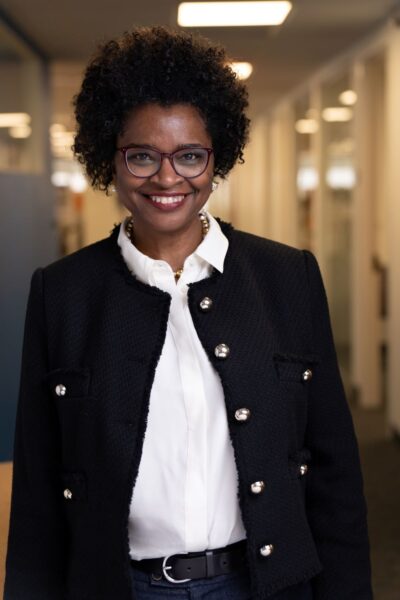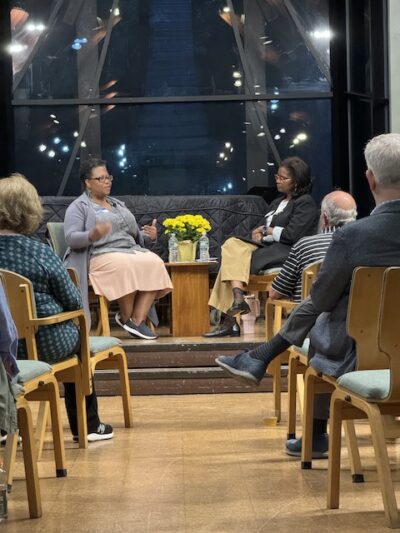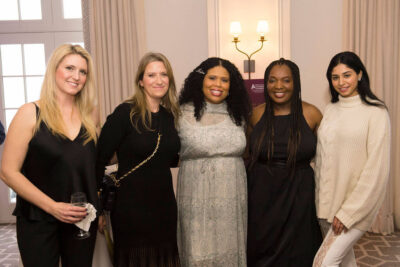
For many women, particularly young women, these have not been the best of times. They see the loss of bodily autonomy with the overturn of Roe versus Wade, coupled with the Nov. 5 defeat of Vice President Kamala Harris, the first woman of color nominated for president of the United States, by former President Donald J. Trump, who was found liable for sexual abuse, and his cabinet nominations of others who have been accused of sexual misconduct, as a kind of disenfranchisement.
While another Women’s March, “Our Bodies, Our Future,” is planned for Jan. 18, some women are taking more drastic steps, researching 4B, a South Korean-born radical feminist movement in which participants disengage from men – as in no dating, no sex, no marriage and no children.
But gender and racial inequality are nothing new, said Lutonya Russell-Humes, vice president of grants and programs at Fairfield County’s Community Foundation, whose 26-year-old Fund for Women & Girls – New England’s largest – works to address those inequities:

“…In a lot of ways, the issues that we face today and expect to face in the coming four years are the same issues we faced on Nov. 4 – pay disparity. Pay equity was a problem Nov. 4. The disparate accessibility to health care and mental health care was an issue on Nov. 4, and we expect that that will continue to be an issue…. If we think about the policies that we might expect, will it become more challenging? Absolutely. If we account for the intersection of race, it becomes even more of an issue.
The problems are not merely national, she added, but local: “….We often think of Fairfield County as one of the wealthiest counties in the country, but it is also either No. 1 or No. 2 in terms of disparate economic outcomes between those who are wealthy and those who are not.”
According to Fairfield County’s Community Foundation — which focuses on income and asset building, housing, youth education and workforce development and health for women and girls through the lens of racial equity – the median income for White households in the county is $124,000; for Black and Latino households, $60,000. Among Whites, home ownership stands at 78%; among Blacks or Latinos, 41%. And while some have questioned the need for traditional higher education in a country that has had an anti-intellectual streak dating from the colonial period, the foundation’s data suggests a correlation between at least a high school diploma and financial gain. Only 4% of White residents lack a high school diploma, while 29% of Latino residents and 13% of Black residents lack one.
For women and girls, https://fccfoundation.org/fund-for-women-girls/ the situation is starker. The annual median income for men is $85,000; for women, $68,000. The poverty rate for female-led families is 27%, compared to 17% for male-led families.
A “glass half-full” person, the Mississippi-bred Russell-Humes – who holds a Bachelor of Arts degree in sociology from Mississippi Valley State University and a Masters of Public Administration with a concentration in government from Pace University and served as executive director of the Boys & Girls Club of New Rochelle before joining Fairfield County’s Community Foundation in 2021 – sees this moment as “a tremendous opportunity for us to be creative.
“Maybe it’s time for us to think differently about how we tackle those challenges,” she added. “And so we need all hands on deck. We need philanthropists. We need policy-makers. We need legislators. And we need women and girls at the table themselves, telling us what the solutions should be….The people who are most impacted are the ones who have the answers….This cannot be done in ivory towers….”
One practical example of creating such systemic change was the October 2023 launch of the Black Maternal Health Initiative. Black women are three times more likely to die of pregnancy-related causes than White women, Russell-Humes said. The Black infant mortality rate is three times that of White babies, and low-birth weights are twice as likely for Black babies as they are for White infants.
The Fund for Women & Girls brought together eight organizations, representing policy-making, academia, health care and community organizing, to come up with the underlying causes and solutions for the disparity in pregnancy outcomes for Black women. This resulted in three approaches:

- Train more doulas, people who provide pregnant women with information, advice and physical and emotional support before, during and after childbirth. In Connecticut, they are reimbursed through Medicaid. The Fund for Women & Girls, working with Doulas4CT and The Community Health Workers Association of Connecticut (CHWACT), is expanding the number of doulas – from the Greek “doulē,” meaning “female helper or maidservant” – by funding training at CT State Community College Gateway for 20 students, 10 of whom will graduate Dec. 15 and enter the mentorship and internship phase of the program in the new year.
- Advocate for policy changes that address the implicit biases in health care by reviewing training at birthing hospitals across Fairfield County, in partnership with the Connecticut Hospital Association.
- Engage in community education. “All of this is embedded in research,” Russell-Humes said.
In December, the fund’s emme (empowerment, mindfulness, motivation, education) Coalition, a partnership with Optimus Health Care in Bridgeport will sunset after four years of using community health workers to help 100 women of childbirth age achieve a more holistic approach to health, work, finances, relationships and self-worth. Of the 100 participants, all those who became pregnant had healthy babies, Russell-Humes said, compared with 73% of non-emme participants at Optimus.
Elements of emme – including screening techniques and intense support for at-risk patients — have been grandfathered into how Optimus operates. In addition to systemic investments like the emme Coalition and the Black Maternal Health Initiative, she said the fund continues to make grants to individual organizations that serve women more immediately, like food pantries, adding that “any deterioration of the safety net will affect women more acutely and specifically women and girls of color.” (For fiscal year 2024, Fairfield County’s Community Foundation has awarded just shy of $1 million to 27 county nonprofits. Find the organizations on this page. To date, the foundation’s Fund for Women and Girls has made grants totaling $11 million.)
Can poverty and prejudice be eliminated and parity achieved? “That depends on public will,” Russell-Humes said. “What I see as our role is that people are educated and understand what the issues are so that we hopefully can build the public will.”

The fund was founded on the will of women of all persuasions, who continue to support it, just as women of various backgrounds buoy organizations like the Women’s Business Development Council (WBDC). We asked her, though, about the phenomenon of the majority of white women supporting Trump when on a grassroots plane they are often supportive of women of color and issues he does not espouse. Why the disconnect?
“Economics and self-interest can sometimes trump sisterhood,” Russell-Humes said, no pun intended.” “And so people when they vote, they vote in their own self-interest. And sometimes that can be aspirational.”
And sometimes, she added, it isn’t. “It doesn’t mean that they don’t think (the equality and advancement of women and minorities) aren’t valuable and important…. It may be a matter of what they believe is the role of government in supporting those things. I would venture to say we have tons of supporters across the political spectrum. They don’t care about the work we do any less, because they are one stripe or another. But how they vote is not always dictated by their own philanthropic or charitable interests.”
Her answer to a question on whether 4B is right to disengage with men was equally insightful as it considered the nuanced difference between stepping back and stepping down.
“I say this as a Black woman: The last several years have been challenging, I think, to say the least. We’ve seen the erosion of rights that we’ve had for the last 50 years…and there’s real concern about the erosion of additional rights. Some of us rolled up our sleeves and dove head-first in to meet the challenge. And now some of us are tired, and we need to rest. And sometimes the most revolutionary thing you can do is to take self-care and rest so that you can live to fight another day.”
The foundation, however, remains as engaged as ever in improving the lives of underserved minorities as well as women and girls.
“Hope is not lost,” Russell-Humes said. “We are up for the challenge…. It is just a matter of everyone rolling up their sleeves to do the work. And we at Fairfield County’s Community Foundation are prepared to do just that.”




















